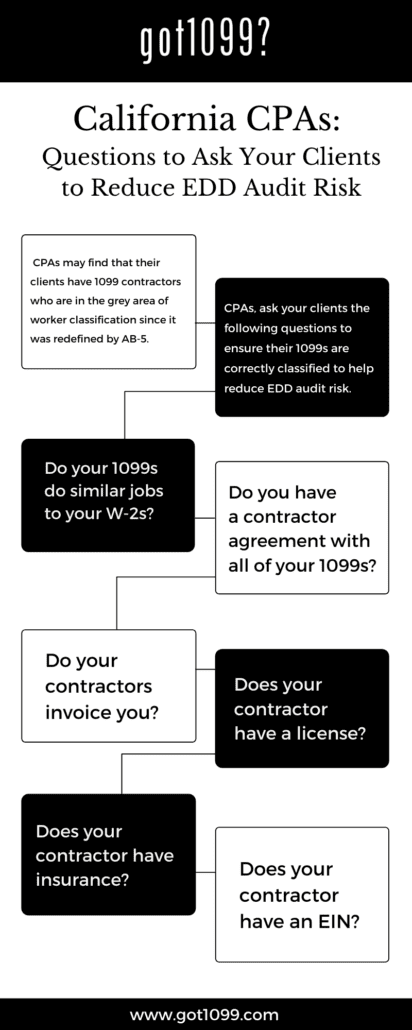Certified Public Accountants (CPAs) have the most insight into their business owner clients’ daily transactional history. In this role, you may find that your business owner clients have 1099 contractors who are in the grey area of worker classification now that classification was redefined by AB-5 in January 2020.
Under the new bill, all workers are automatically classified as W-2 employees unless they meet all three of the following criteria:
- “The worker is free from the control and direction of the hiring entity in connection with the performance of the work, both under the contract for the performance of the work and in fact;
- The worker performs work that is outside the usual course of the hiring entity’s business; and
- The worker is customarily engaged in an independently established trade, occupation, or business of the same nature as that involved in the work performed.”
We frequently see cases of inadvertent contractor misclassification that are flagged by The Employment Development Department (EDD). EDD audits are most commonly triggered by:
- Independent contractors filing for unemployment benefits
- Employee complaints or reports
- Late tax filings
- Random verification audits
If the agency finds any misclassified workers during the audit, your business will likely be responsible for paying resulting fines, fees, and penalties that can be damagingly high if left unaddressed.
With this in mind here are questions you can ask your clients to ensure that their 1099s are correctly classified, and help your clients reduce the risk of an EDD Misclassification Audit.
Do your 1099s do similar jobs to your W-2s?
1099 independent contractors who perform similar jobs as W-2 employees may be considered an employee during an audit unless there is a clear distinction between the two. Make sure that there are clear distinctions between the two. W-2 employees work regulated hours, have specific job functions, are provided work equipment, and are told when and how to perform their job duties. They also receive employee benefits and do not have a clear end date for the work performed.
On the other hand, 1099 independent contractors have flexible working hours, flexible job requirements as dictated through the contract, must provide their own work equipment, can work for multiple employers at the same time, and are not directly managed on job functions. They do not receive employee benefits and typically have a clear job end date.
For example, one of your business owner clients may have a marketing coordinator who is classified as an employee. Your client may want to hire a marketing agency for a website redesign as a 1099 independent contractor. While both the marketing coordinator and the marketing agency perform job functions under the marketing umbrella, their job functions and classifications are different.
The coordinator develops and executes the client’s marketing strategy specifically for your client’s company for as long as they work in that specific role. The hired marketing agency will perform the website redesign for your client until the project is complete. Once finished, the partnership is completed. While the marketing agency is working on your client’s website redesign, they can simultaneously work for other companies.
Do you have a contractor agreement with all of your 1099s?
Independent contractor agreements outline specific details for the job the independent contractor will perform. It is the working arrangement between the client and the contractor that typically includes:
- A description of the job or service provided by the contractor
- Payment details (this can include information about retainers, deposits, and billing)
- The length and term of the project or service
Do your contractors invoice you?
Invoices help keep records of payments, work performed, and hours worked. Having organized records of invoices between the contractor and the client help EDD verify that the independent contractor is indeed an independent contractor.
Clients who put 1099s on scheduled payroll put themselves at risk for a misclassification audit. W-2 workers should be placed on payroll but not 1099s.
Does your contractor have a license?
Some workers, such as healthcare professionals and construction workers, are required to provide proper licenses to work. Failing to hire workers with proper licensure can open your client’s business to hefty fines and penalties from EDD.
If your client hires contractors who don’t have licenses do they have:
- A website?
- A social media presence?
- A marketing budget?
Does your contractor have insurance?
Independent contractors provide their own insurance to cover liability, workers’ compensation, and other risks to help them protect their business. If your client is insuring their independent contractors, this is a sign they may actually be W-2 employees.
Does your contractor have an EIN?
An EIN is an Employer Identification Number. This is a unique tax identification number for businesses in the United States to pay state and federal taxes. Asking independent contractors without an EIN to provide one is a simple way to further ensure they are 1099s.
All of these factors add up to a robust defense against a misclassification audit by EDD. By fixing any misclassification errors ahead of an audit, CPAs can save their business owner clients the hefty fines and penalties associated with EDD audit results.
How can a got1099 report help you?
California CPAs looking to help their business owner clients properly classify workers can order a got1099 report for each of their independent contractors. The report verifies the status of each worker and provides alerts if an independent contractor’s license expires. If the report finds any missing elements for each contractor, such as a missing website or business license, your client then has time to fix any errors before facing a misclassification audit. Contact our team today with any questions or to start your report.

LOCATION
La Jolla, CA 92037
o: (888) got-1099 (468-1099)
e: contact@got1099.com
copyright got1099®
copyright got1099?®
copyright Start1099®
GET AB-5 And CASLB Updates in your inbox
IMPORTANT INFO
Disclaimer
got1099 is a business reporting company providing business analysis reports to companies re: their 1099 independent contractors We do not provide legal advice. Consult with your attorney relating to any legal issues.


